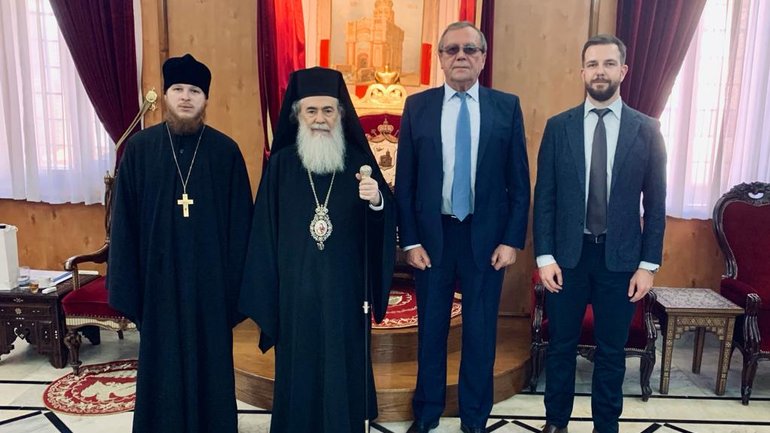Russian ambassador to Israel meets with Patriarch of Jerusalem: visits become more frequent

The participants of the meeting exchanged greetings on the occasion of Christmas and New Year, according to the official website of the Moscow Patriarchate.
"Issues of ensuring the inviolability of the Orthodox religious sites of the Holy Land were discussed. The parties stressed the inadmissibility of any attempts to change the historically established interreligious status quo in Israel, including in the Old City of Jerusalem.
A. Viktorov noted the constant commitment of the Russian Federation to protecting Christians in the Middle East.
The meeting was attended by hieromonk Athanasius (Bukin), treasurer of the Russian Ecclesiastical Mission in Jerusalem. He conveyed to His Beatitude the previously requested information about the most acute cases of aggression by radical groups against the courtyards of the Russian spiritual mission and their inhabitants," the Russian Orthodox Church said in a statement.
It is worth mentioning that the meetings of the Russian ambassador to Israel with the patriarch of Jerusalem have become more frequent. It has already been reported that in mid-June and in July 2021 Russian ambassador Viktorov and Russian FSB envoys already met with the patriarch of Jerusalem. After that, Russian experts again started talking about Amman 2.0.
On August 5 2021 with the blessing of Patriarch Kirill of Moscow and all Russia Metropolitan Hilarion of Volokolamsk head of the Department for External Church Relations of the Moscow Patriarchate also made a working trip to Jordan where he met with Theophilus III.
Patriarch Theophilos III of Jerusalem, in turn, thanked Moscow Patriarch Kirill Gundyaev for his "firmness and consistency" in supporting the Christian presence in the Holy Land in the face of the activation of extremist groups and expressed readiness to meet with him. This is stated in the congratulatory letter on the occasion of the 75th anniversary of Patriarch Kirill, which he celebrated on November 20.
As RISU has reported, the formal initiator of the meeting in Amman in November 2019 was Patriarch Theophilos III of Jerusalem. He made the proposal bypassing Ecumenical Patriarch Bartholomew, after meeting with Kirill and Putin, when he received an award from the Russian "foundation for the unity of Orthodox peoples". The Russian Orthodox Church proposed this as an initiative of Jerusalem. But in fact, it was Moscow that promoted the idea. They wanted to create a new platform for condemning the actions of Constantinople in Ukraine.
Orthodoxy is represented by 15 autocephalous Churches. Four of them (not counting the OCU) made it clear that they would not go to the meeting of the Russian Orthodox Church in Amman. These are the Patriarch of Constantinople, the Archbishop of Alexandria, Cyprus and Greece, heads of the four largest churches. The Russian Orthodox Church broke off relations with Constantinople, Greece and Alexandria because of the recognition of the OCU.
In January 2020, another attempt was made by the Patriarch of Jerusalem, at the suggestion of Moscow, to convene a meeting in Amman to create opposition to the Ecumenical Patriarch because of his "interference" in the Ukrainian church crisis. The Patriarch of Jerusalem got refusals to all of his letters of invitation to the Primates.
Patriarch Bartholomew in January sent a letter to Jerusalem "in a strict tone", in which he reminded that Theophilus is not competent for such steps, so the "initiator" of the Amman meeting no longer insisted on his initiative. The only church that agreed to attend the meeting was the Church of the Czech lands and Slovakia. The Primates of the Greek and Cypriot churches publicly refused to travel.
Thus, despite the entire arsenal of available funds, Russia has not been able to form a grand coalition against Constantinople. Now the general state of orthodoxy on the church map does not look in favor of the Russian Orthodox Church, especially after the invasion Russian Orthodox Church to the canonical territory of the Patriarchate of Alexandria in Africa.









